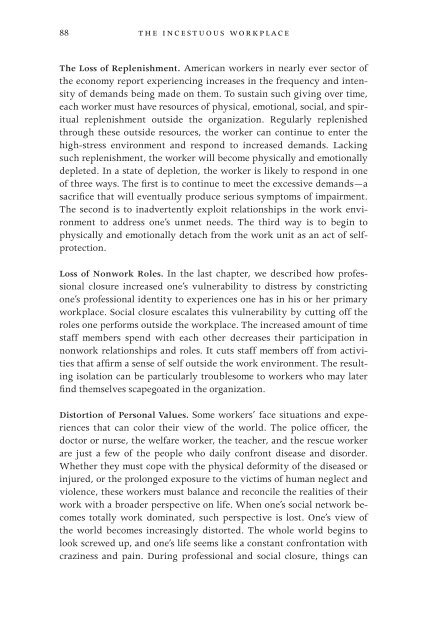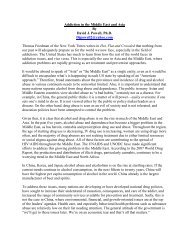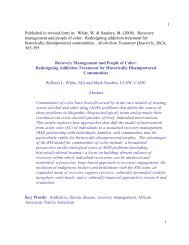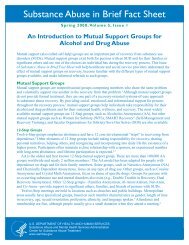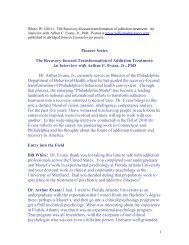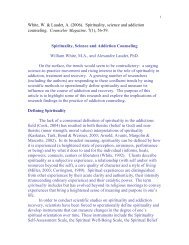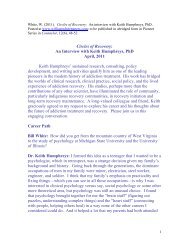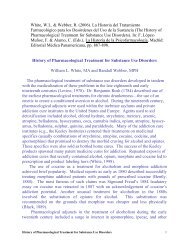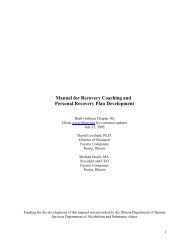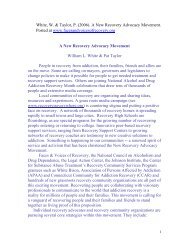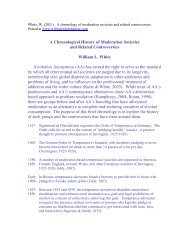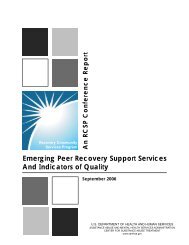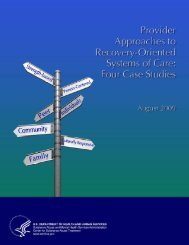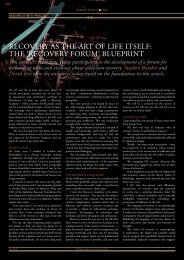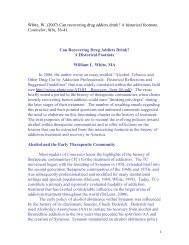- Page 1 and 2:
The Incestuous Workplace
- Page 3 and 4:
Hazelden Center City, Minnesota 550
- Page 5 and 6:
4 5 3.3 The Microsystem / 30 3.4 Th
- Page 7 and 8:
8 9 7.11 Gossip and Rumor: Informat
- Page 9 and 10:
13 14 Systems Interventions: Bounda
- Page 11 and 12:
Acknowledgments There are several p
- Page 13:
xiv t h e i n c e st u o u s wo r k
- Page 16 and 17:
Professional and Organizational Dis
- Page 18 and 19:
Professional and Organizational Dis
- Page 20 and 21:
Professional and Organizational Dis
- Page 22 and 23:
Figure 1-A Individual Indicators of
- Page 24 and 25:
Professional and Organizational Dis
- Page 26 and 27:
Professional and Organizational Dis
- Page 28 and 29:
Professional and Organizational Dis
- Page 30 and 31:
Organizational Responses to Distres
- Page 32 and 33:
Organizational Responses to Distres
- Page 34 and 35:
Organizational Responses to Distres
- Page 36 and 37:
Organizational Responses to Distres
- Page 38 and 39:
Organizational Responses to Distres
- Page 40 and 41:
3 The Systems Approach to Professio
- Page 42 and 43:
The Systems Approach to Professiona
- Page 44 and 45:
The Systems Approach to Professiona
- Page 46 and 47:
The Systems Approach to Professiona
- Page 48 and 49:
The Systems Approach to Professiona
- Page 50 and 51: The Organizational Family Continuum
- Page 52 and 53: The Organizational Family Continuum
- Page 54 and 55: The Organizational Family Continuum
- Page 56 and 57: The Organizational Family Continuum
- Page 58 and 59: The Organizational Family Continuum
- Page 60 and 61: The Organizational Family Continuum
- Page 62 and 63: Figure 4-C The Profession of Organi
- Page 64 and 65: Professional Closure 51 There are b
- Page 66 and 67: Professional Closure 53 allows idea
- Page 68 and 69: Professional Closure 55 simply by a
- Page 70 and 71: Professional Closure 57 gatekeepers
- Page 72 and 73: Professional Closure 59 Homogenizat
- Page 74 and 75: Professional Closure 61 greatest pe
- Page 76 and 77: Professional Closure 63 5.12 Profes
- Page 78 and 79: Professional Closure 65 systems. In
- Page 80 and 81: Professional Closure 67 advancement
- Page 82 and 83: Professional Closure 69 needing to
- Page 84 and 85: Professional Closure 71 the emotion
- Page 86 and 87: Professional Closure 73 5.25 Obsess
- Page 88 and 89: Professional Closure 75 on the prin
- Page 90 and 91: Professional Closure 77 action by t
- Page 92 and 93: Professional Closure 79 of adversit
- Page 94 and 95: Professional Closure 81 decisions i
- Page 96 and 97: Professional Closure 83 deified per
- Page 98 and 99: Social Closure 85 undesirable or un
- Page 102 and 103: Social Closure 89 begin to look hop
- Page 104 and 105: Social Closure 91 An opening become
- Page 106 and 107: Social Closure 93 relationships bot
- Page 108 and 109: 7 Sexual Closure It is hard to beli
- Page 110 and 111: Sexual Closure 97 produced by close
- Page 112 and 113: Sexual Closure 99 free choices of i
- Page 114 and 115: AREA OF INCEST DYNAMIC IN INCEST DY
- Page 116 and 117: Sexual Closure 103 combined experie
- Page 118 and 119: Sexual Closure 105 counter feelings
- Page 120 and 121: Sexual Closure 107 currently being
- Page 122 and 123: Sexual Closure 109 counselor and th
- Page 124 and 125: Sexual Closure 111 were held by les
- Page 126 and 127: Sexual Closure 113 they split up, m
- Page 128 and 129: Sexual Closure 115 as staff members
- Page 130 and 131: Sexual Closure 117 exploitation by
- Page 132 and 133: Sexual Closure 119 systems that all
- Page 134 and 135: Sexual Closure 121 Analysis. The re
- Page 136 and 137: Sexual Closure 123 D. Social and se
- Page 138 and 139: Sexual Closure 125 Again we see the
- Page 140 and 141: Sexual Closure 127 8. Though often
- Page 142 and 143: Why Closure? 129 program, successfu
- Page 144 and 145: Why Closure? 131 the destructive fo
- Page 146 and 147: Why Closure? 133 government. But co
- Page 148 and 149: Porous Organizations and Their Lead
- Page 150 and 151:
Porous Organizations and Their Lead
- Page 152 and 153:
Porous Organizations and Their Lead
- Page 154 and 155:
Porous Organizations and Their Lead
- Page 156 and 157:
Porous Organizations and Their Lead
- Page 158 and 159:
Porous Organizations and Their Lead
- Page 160 and 161:
Porous Organizations and Their Lead
- Page 162 and 163:
Porous Organizations and Their Lead
- Page 164 and 165:
Porous Organizations and Their Lead
- Page 166 and 167:
Porous Organizations and Their Lead
- Page 168 and 169:
10 Role Conditions and the Worker C
- Page 170 and 171:
Role Conditi0ns and the Worker Casu
- Page 172 and 173:
Role Conditi0ns and the Worker Casu
- Page 174 and 175:
Role Conditi0ns and the Worker Casu
- Page 176 and 177:
Role Conditi0ns and the Worker Casu
- Page 178 and 179:
Role Conditi0ns and the Worker Casu
- Page 180 and 181:
Role Conditi0ns and the Worker Casu
- Page 182 and 183:
Role Conditi0ns and the Worker Casu
- Page 184 and 185:
Role Conditi0ns and the Worker Casu
- Page 186:
Role Conditi0ns and the Worker Casu
- Page 189 and 190:
176 t h e i n c e st u o u s wo r k
- Page 191 and 192:
178 t h e i n c e st u o u s wo r k
- Page 193 and 194:
180 t h e i n c e st u o u s wo r k
- Page 195 and 196:
182 t h e i n c e st u o u s wo r k
- Page 197 and 198:
184 t h e i n c e st u o u s wo r k
- Page 199 and 200:
186 t h e i n c e st u o u s wo r k
- Page 201 and 202:
188 t h e i n c e st u o u s wo r k
- Page 203 and 204:
Figure 11-D Replenishment Network D
- Page 205 and 206:
192 t h e i n c e st u o u s wo r k
- Page 207 and 208:
194 t h e i n c e st u o u s wo r k
- Page 209 and 210:
12 Surviving Toxic Systems In the l
- Page 211 and 212:
198 t h e i n c e st u o u s wo r k
- Page 213 and 214:
200 t h e i n c e st u o u s wo r k
- Page 215 and 216:
202 t h e i n c e st u o u s wo r k
- Page 217 and 218:
204 t h e i n c e st u o u s wo r k
- Page 219 and 220:
206 t h e i n c e st u o u s wo r k
- Page 221 and 222:
208 t h e i n c e st u o u s wo r k
- Page 223 and 224:
210 t h e i n c e st u o u s wo r k
- Page 225 and 226:
212 t h e i n c e st u o u s wo r k
- Page 227 and 228:
214 t h e i n c e st u o u s wo r k
- Page 229 and 230:
216 t h e i n c e st u o u s wo r k
- Page 231 and 232:
218 t h e i n c e st u o u s wo r k
- Page 233 and 234:
220 t h e i n c e st u o u s wo r k
- Page 235:
222 t h e i n c e st u o u s wo r k
- Page 238 and 239:
Systems Interventions: Boundary Man
- Page 240 and 241:
Systems Interventions: Boundary Man
- Page 242 and 243:
Systems Interventions: Boundary Man
- Page 244 and 245:
Systems Interventions: Boundary Man
- Page 246 and 247:
Systems Interventions: Boundary Man
- Page 248 and 249:
Systems Interventions: Boundary Man
- Page 250 and 251:
Systems Interventions: Boundary Man
- Page 252 and 253:
Systems Interventions: Boundary Man
- Page 254 and 255:
Systems Interventions: Boundary Man
- Page 256 and 257:
Systems Interventions: Boundary Man
- Page 258 and 259:
Systems Interventions: Boundary Man
- Page 260 and 261:
Systems Interventions: Boundary Man
- Page 262 and 263:
Systems Interventions: Boundary Man
- Page 264 and 265:
Systems Interventions: Boundary Man
- Page 266 and 267:
Systems Interventions: Boundary Man
- Page 268 and 269:
Systems Interventions: Boundary Man
- Page 270 and 271:
Systems Interventions: Boundary Man
- Page 272 and 273:
Systems Interventions: Boundary Man
- Page 274:
Systems Interventions: Boundary Man
- Page 277 and 278:
264 t h e i n c e st u o u s wo r k
- Page 279 and 280:
266 t h e i n c e st u o u s wo r k
- Page 281 and 282:
268 t h e i n c e st u o u s wo r k
- Page 283 and 284:
270 t h e i n c e st u o u s wo r k
- Page 285 and 286:
272 t h e i n c e st u o u s wo r k
- Page 287 and 288:
274 t h e i n c e st u o u s wo r k
- Page 289 and 290:
276 t h e i n c e st u o u s wo r k
- Page 291 and 292:
278 t h e i n c e st u o u s wo r k
- Page 293 and 294:
280 t h e i n c e st u o u s wo r k
- Page 295 and 296:
282 Confronting Overproduction. Som
- Page 297 and 298:
284 t h e i n c e st u o u s wo r k
- Page 299 and 300:
286 t h e i n c e st u o u s wo r k
- Page 301 and 302:
288 t h e i n c e st u o u s wo r k
- Page 303 and 304:
290 t h e i n c e st u o u s wo r k
- Page 305 and 306:
292 t h e i n c e st u o u s wo r k
- Page 307 and 308:
294 t h e i n c e st u o u s wo r k
- Page 309 and 310:
296 14.16 A Personal Note in Closin
- Page 311 and 312:
Glossary Boundary. The invisible sk
- Page 313 and 314:
Glossary 301 Ecosystem. The multila
- Page 315 and 316:
Glossary 303 Replenishment Network.
- Page 317 and 318:
Glossary 305 Social Closure. The me
- Page 319 and 320:
308 t h e i n c e st u o u s wo r k
- Page 321 and 322:
310 t h e i n c e st u o u s wo r k
- Page 323 and 324:
312 t h e i n c e st u o u s wo r k
- Page 325 and 326:
314 t h e i n c e st u o u s wo r k
- Page 327 and 328:
William L. White, m.a., is a senior


